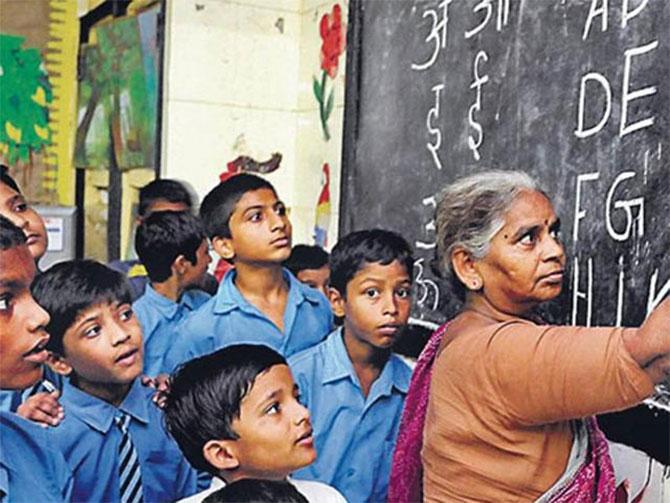'Education will definitely benefit by making the child's first language the medium of instruction, by making examinations less prone to rote-learning, by setting up national research universities, all recommendations of the NEP,' observe Pankaj Jain and Shreekant Sambrani.

Any policy must have a concrete, attainable goal, which in turn must arise from the context of current reality.
Suppose you have a car with bum transmission and steering. You give it a nice coat of paint, reupholster the seats and fix the suspension.
It will still have difficulties getting you from point A to point B. That is because your car policy was not rooted in the reality of its inability to transport you smoothly. The much-touted New Education Policy (is a bit like that.
What is the contextual reality of our education? Our public and private expenditure on education is 5.5 per cent of the GDP, equivalent to that of the OECD countries, as compared to the repeated goal of all governments and NEP of 6 per cent.
Many states allocate more than 10 per cent of their budgets (the norm in OECD countries) to education.
The outcome -- a term much used in NEP -- despite these outlays is that half of the fifth graders cannot muster mathematical and linguistic skills expected of second graders.
Fully one half of the government primary schools have fewer than 100 students. Many have no teachers; in those that have them, not all the teachers actually teach.
The stress so far has been on opening new schools to improve access and recruiting teachers, rather than on monitoring whether these resources are effectively deployed.
Regular teachers jobs are highly coveted, since their salaries are relatively high and responsibilities nil. This ground reality calls into question the basic premise of NEP that more resources for education is a prerequisite.
The story is no different at higher levels. A proliferation of industrial training institutes (ITIs) do not turn out adequate numbers of skilled artisans for India to become factory to the world.
Many world class manufacturing firms prefer not to take chances and recruit diploma-holder engineers to perform tasks otherwise meant for ITI-trained personnel.
Degree-holder engineers prefer to become junior professionals -- read data entry personnel -- in IT companies.
The students' lack of interest is matched in equal measure by the lackadaisical teacher attitude and the near-absence of basic facilities such as libraries and laboratories in most institutions.
The learning levels of college graduates are considered almost insignificant by potential employers, and unfortunately, also by the teachers and the students themselves.

Harvard Professor Lant Pritchett, who has been working in India since 2004, characterised our education system as turning out millions with zero skills. He called them schooled, but not educated.
Despite their large population, Indian institutions of higher or professional education are only rarely listed among the peer-rated top institutions globally.
Their academic output measured by publications or citations in peer reviewed professional journals leaves much to be desired.
Yet, as Professor Pritchett observes, India regularly producers over 100,000 top-rated graduates in various disciplines every year.
This is a testimony to the innate quality of students and not to the training or learning they receive at various institutions.
The NEP document emphasises critical thinking and free enquiry as the spirit of true education. Prime Minister Narendra Modi has said that NEP aims to make the youth job-creators and not merely job-seekers.
These are entirely unexceptionable statements of intent. But it is not clear how the revamped educational tenure of 3-3-5-4 is going to be any better than the earlier one of 10+2+3.
Similarly, the proposed various exit points from the education stream would most likely end up being rationalisation of what we now call drop-out points.
Catching them young by integrating what are currently pre-school years into the main stream is a good idea, but entrusting this critical task to aanganwadi workers, who are even more poorly qualified and trained than primary teachers, is not.
Making institutions of higher learning multi-disciplinary is a laudable idea, but ignores the fact that what few institutions of any global recognition we have are mostly specialist ones, the IITs and the IIMs.
The engine, steering and transmission of the educational vehicle are teachers, libraries and laboratories/workshops respectively.
The NEP recommendation of extending the school teachers' training duration to four years from the present two is not likely to solve the basic problem, which is a complete absence of accountability and habitual absence from schools.
The difficulties the burgeoning numbers of IITs and IIMs have had in recruiting faculty show that teaching jobs in institutions of higher learning do not attract even competent applicants, leave alone top talent, as those in institutions abroad do.
Until resource allocations among various heads of expenditure is rationalised, libraries and laboratories will only get crumbs left over from meeting bloated salary bills.
Does this make NEP a cruel joke perpetrated on our faltering education system? That is not entirely so.
Education will definitely benefit by making the child's first language the medium of instruction, by making examinations less prone to rote-learning, by setting up national research universities, all recommendations of the NEP.
In this regard, it is a great improvement, as, unlike the right-to-education policies, it does not stop us from finding and implementing good solutions for known problems of our schools.
NEP indeed could open pathways to pragmatic solutions if we read between the lines and shake off our lethargy.
Pankaj Jain is the Founder Chief Executive of Gyan Shala, one of the largest NGOs in India educating urban poor children. Shreekant Sambrani is an economist.
Feature Presentation: Rajesh Alva/Rediff.com











 © 2025
© 2025